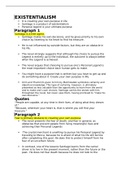EXISTENTIALISM
It is creating your own purpose in life
Santiago is a product of existentialism
Personal legend is your ultimate purpose
Paragraph 1
Santiago is a free agent.
Santiago makes his own decisions, and he gives priority to his own
choice by listening to his heart to find his treasure.
He is not influenced by outside factors, but they are an obstacle in
his life.
The novel strongly suggests that although the choice to pursue the
Legend is entirely up to the individual, the outcome is always better
when the Legend is achieved.
The novel argues that choosing to pursue one’s Personal Legend is
the most important choice each human gets to make.
You might have a purpose that is written but you have to get up and
do something about it. Create your own purpose in life.
Urim and Thummim given to him by Melchizedek symbolize certainty and
objective knowledge. This type of certainty, however, is ultimately
presented as less valuable than the opportunity to learn from the world
and to make one’s own choices. Santiago carries the stones with him
throughout the novel, but never uses them, having promised to “make his
own decisions.”
Quotes
“People are capable, at any time in their lives, of doing what they dream
of.”
“Because, wherever your heart is, that is where you will find your
treasure.”
Paragraph 2
Fear is primary obstacle to creating your own purpose
The novel presents the fear of death, and fear in general, as
obstacles that prevent people from living meaningful lives and
achieving their Personal Legends
The crystal merchant is unwilling to pursue his Personal Legend by
traveling to Mecca, because he is afraid of what his life will be like
after completing this goal. He does this to protect himself from his
fear of an uncertain future.
In contrast, one of the lessons Santiago learns from the camel
driver is to live in the present moment, rather than the future or the
past.. He does not fear death because he does not look to the
, future, and his reward is the quality of his life in each given
moment.
Because Santiago comes to believe that death is not a threat, he is
able follow the omens God lays out before him, and to do so without
fear. He also learns how to appreciate life as it is lived, and to find
and experience the happiness and joy of being alive in the present.
The novel also shows how the pursuit of one’s Personal Legend
emphasizes the insignificance of death and fear. Because the
pursuit of his Personal Legend is the fullest expression of himself,
Santiago recognizes that following his Legend is worth any risk,
even the risk of death.
As the alchemist puts it, fear will prevent Santiago from listening to
his heart, and it will prevent him from accessing his own self, which
in turn is his key to accessing the Soul of the World.
Quotes
“There is only one thing that makes a dream impossible to achieve: the
fear of failure.”
“Don’t give in to your fears,” “If you do, you won’t be able to talk to your
heart.”
Paragraph 3
Santiago’s journey to create his own purpose has played a great role on
his character development
Along the way Santiago encounters a variety of characters who
teach him about life and listening to his heart. By the end of the
novel, Santiago is confident in himself and in the Soul of the World,
which he believes looks out for him and connects all things.
Yet as Santiago realizes near the end of the novel, this life
improvement comes not so much from the simple achievement of
the Legend, but instead from the purpose and engagement that
pursuit of the Legend gives to one’s everyday life.
The journey is more valuable than the end goal. His destiny was to
go back to where had start, the abandoned church where the
sycamore tree grew. His treasure was not the chest of Spanish gold
coins but rather the lessons he learnt and the people he met on his
journey.
He met the love of his life, Fatima, in the desert oasis.
The love between Santiago and Fatima is a love that is sincere and
true but also involves faith rather than any effort to control the
beloved.




